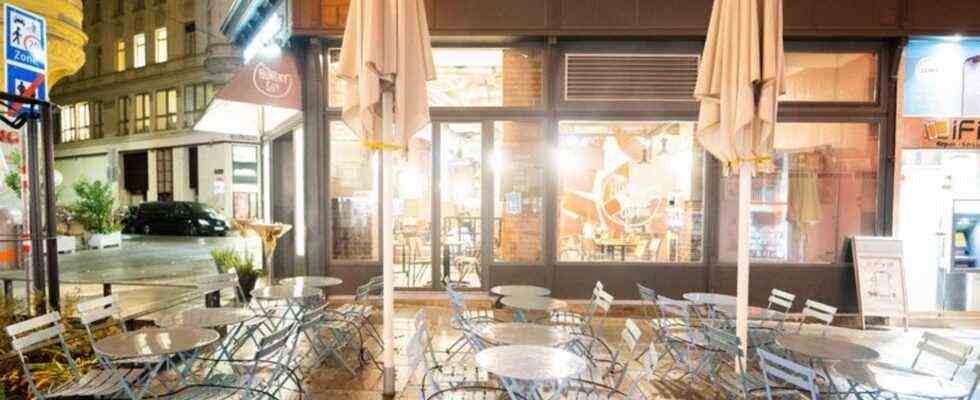Corona pandemic
Trade closed, schools open – Austria’s course through the lockdown
Swept empty. A restaurant in Vienna. Photo: Georg Hochmuth / APA / dpa
© dpa-infocom GmbH
Austria is in an extremely critical corona situation. The country is looking for a way out with well-known rules, but also new impulses. The economy is already beginning to suffer – and is hoping for Christmas.
In the fourth lockdown, Austria dares an experiment: the schools remain open. The government has left it to the parents to decide whether or not to send their offspring to school.
According to initial figures from the Ministry of Education, on Monday, at the start of the lockdown, 70 percent of children and adolescents were wearing an FFP2 mask in the classroom. According to the ministry, no online lessons are planned for those who stayed at home, but weekly task packages.
“It is an absolute communication disaster,” said teacher union leader Paul Kimberger of the German press agency. “The main problem is the lack of clarity,” said Austria’s federal school spokeswoman Susanna Öllinger. The 18-year-old reported that in some schools directors had exerted pressure to continue attending classes.
Schoolchildren particularly badly affected
The explosive factor is that the corona virus is particularly rampant in the school age group. The seven-day incidence, at 2200, is twice that of the general population. The ministry’s argument is that the students would be tested three times a week and so perfectly monitored. In addition, experience has shown that home schooling was overwhelming for many parents and children.
Austria is otherwise maneuvering with known rules – all shops beyond daily needs are closed – and new measures due to its massive fourth corona wave. As a pioneer in the EU, the compulsory vaccination from February 2022 should prevent a new disastrous lockdown in the medium and long term. Prior to this, experts, social partners and civil society should examine the draft law, as emphasized by the Ministry of Health.
According to constitutional experts, this is not even necessary. “That is fully discussed,” said the lawyer Heinz Mayer in the ORF, also with a view to the European jurisprudence. The personal rights would have to be secondary in cases in which the necessary protection of the community is at stake. Currently, fines of a few thousand euros or, in extreme cases, a driver’s license withdrawal are being discussed in public for persistent vaccination refusals.
Numerous vaccination incentives
To boost the vaccination quota, the public broadcasting corporation ORF has now organized a lottery in which vaccinated people can even win a prefabricated house. Such gambling incentives for an injection were and still exist in the federal states of Burgenland and Upper Austria. The vaccination rate in Austria is now 66.1 percent.
Whether the latest number of new corona infections is a glimmer of hope or a flash in the pan will become clear in the course of the week. With 9513 cases, fewer than 10,000 new cases were counted within 24 hours in Austria on Tuesday for the first time in two weeks. Most recently, up to around 16,000 new infections were registered. Despite this decline, the number of beds occupied by Covid patients in the clinics continued to rise.
Since the beginning of the month, the 3G rule at work and the 2G rule, which prohibits unvaccinated people from visiting local restaurants, have been in effect in Austria. Given the high seven-day incidence of 1,100 per 100,000 population, a lockdown for everyone went into effect on Monday. It should last until December 13th.
The economy is starting to suffer
The measures are already leaving their mark on the economy. Even the restrictions for the approximately two million unvaccinated people would have lowered the weekly indicator collected by the Institute for Economic Research (Wifo), said Wifo boss Gabriel Felbermayr. A week of downtime currently costs around 800 million euros. Towards Christmas it will be around one billion euros per week.
Labor Minister Martin Kocher expects the number of short-time workers to quadruple from currently 80,000 to 300,000 to 400,000. Much now depends on whether at least part of the Christmas business can be saved, it said.
There should be a touch of normalcy on some ski slopes. Contrary to expectations, the operation of ski lifts and mountain railways was in principle permitted in compliance with the safety rules. This is good news for locals who are allowed to go up the mountain for physical relaxation.
For long journeys with overnight tourists there is no green light in lockdown. Bars and most of the hotels are closed anyway. The latter are only allowed to accommodate business travelers or people who can substantiate other compelling reasons.
In the discussion about schools, the Ministry of Education took a first step towards clarity on Tuesday: It announced that in future all classes from the second case of infection will be sent to distance learning for at least five days.

